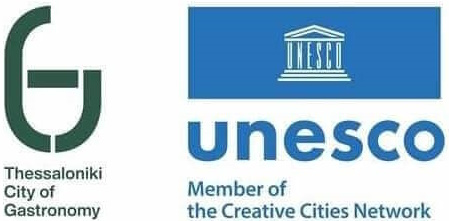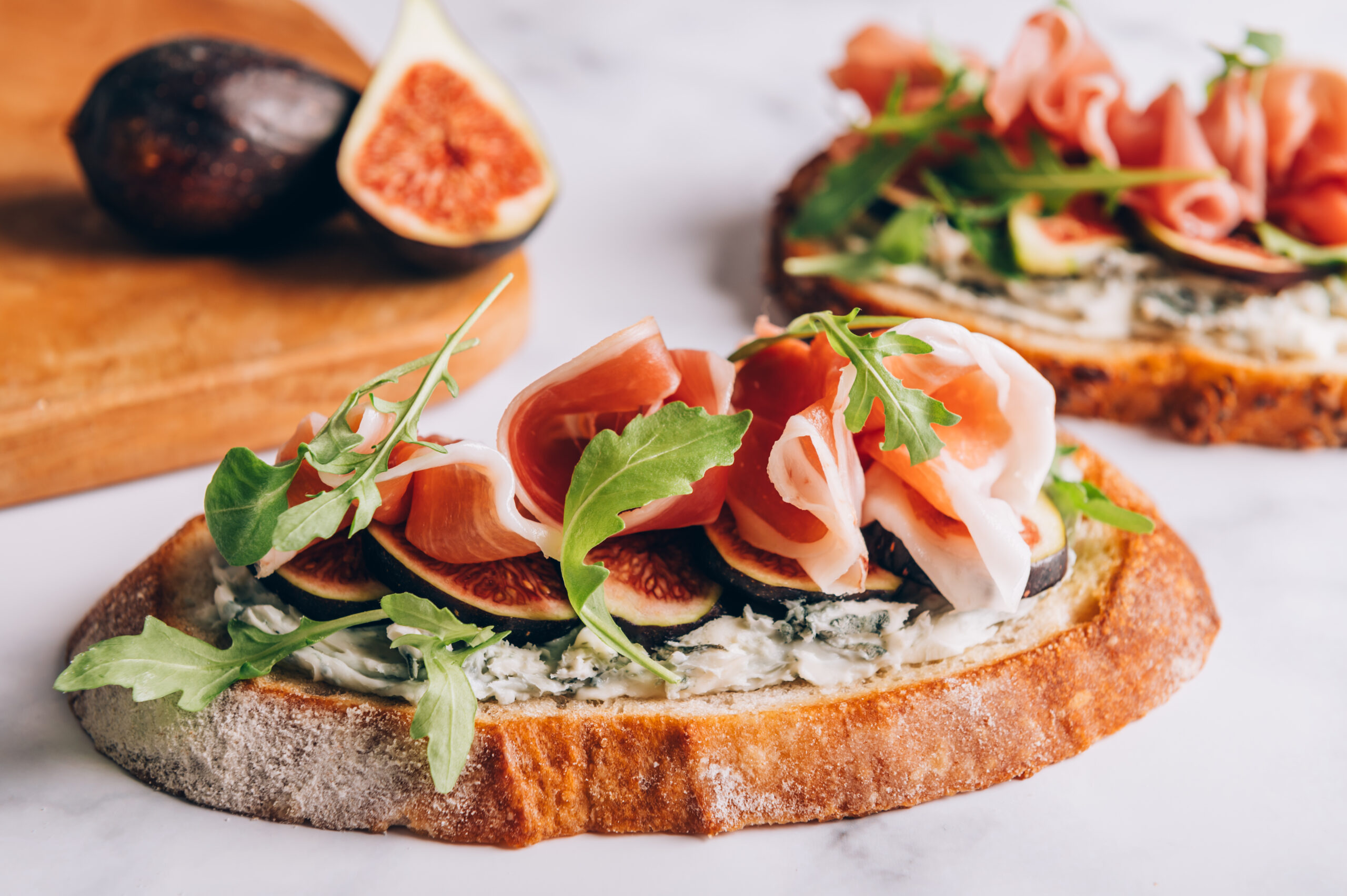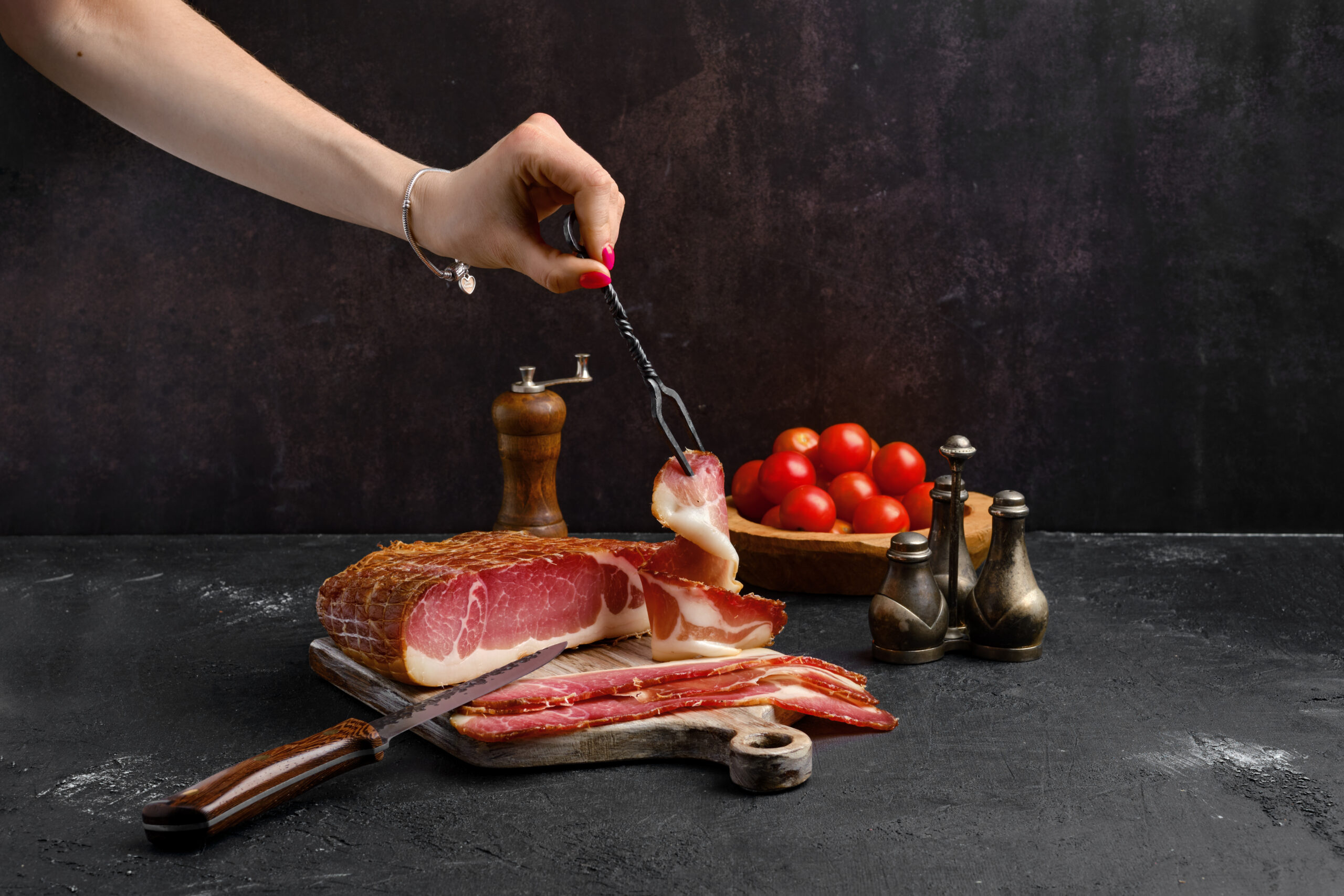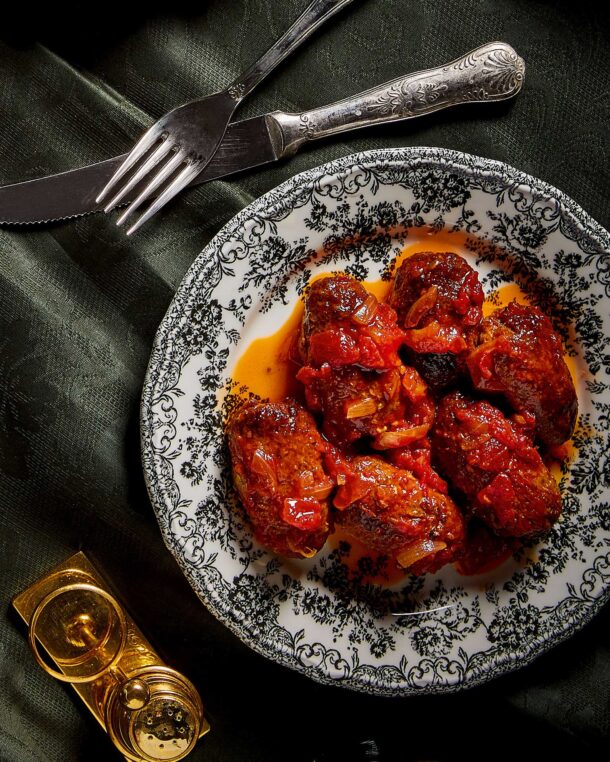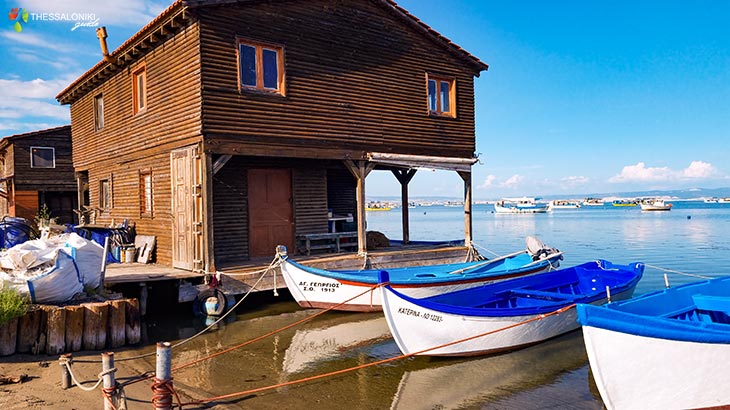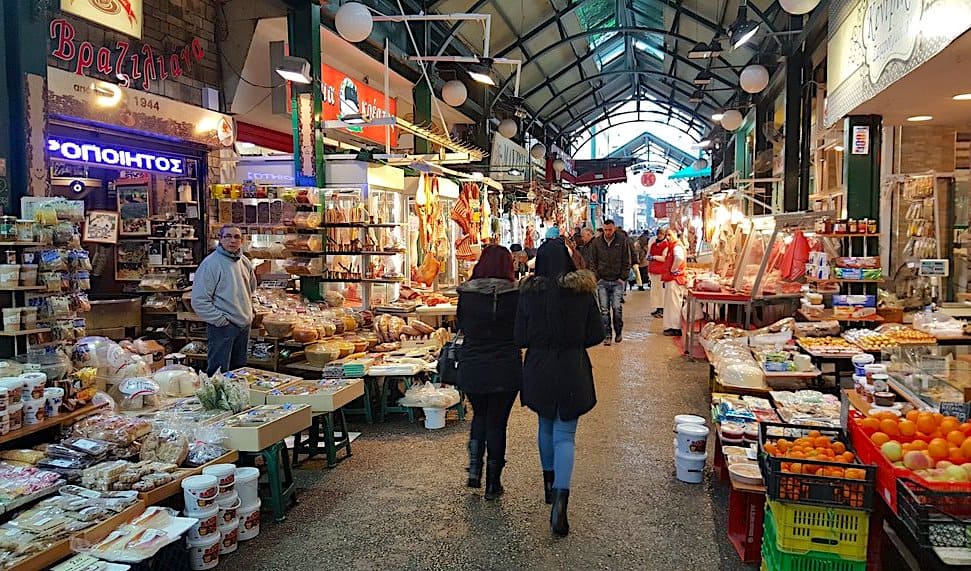The Thessaloniki Central Market (TH.C.M. S.A.), also known as Lachanagora (Vegetable Market), is the spot where 600-800 tons of fruit and vegetables are traded daily, as well as about 600 tons of meat, on a weekly basis, in the region of Thessaloniki. It is estimated that an average of 2.000 vehicles enter the market on a daily basis while the number of employees and visitors amounts to 5.000.The TH.C.M. premises, also house transport and accounting offices, stationery and packaging shops, a restaurant and canteens.
Social Plate
Social Plate is a special action with a social profile from Thessaloniki Central Market and is the only one in whole Greece. Aim of the project’s action is to combat poverty and social exclusion and to support social agencies with the same goals. In April 2018, TH.C.M. established the “Social Food Aid Civic Non-Profit Company” with the distinctive title “Social Plate” as part of the INTERREG V-A Greece-Bulgaria 2014-2020.
Every day, traders of the TH.C.M. S.A. deliver non-marketable fruits and vegetables to the “Social Plate” offices and under the supervision of the quality control manager, the products are separated to those that are suitable for consumption and to those that are not. Then, with the help of volunteers from the agencies that benefit from the program, the products are repackaged.
Social agencies of the region (Social Grocery Stores, Non-Governmental Organisations, Church Kitchens, Collectives, etc.) that are working with the program receive the recovered products and distribute them, cooked or fresh, to vulnerable groups of our society. In this way, homeless, unemployed, refugees, and anyone in need of a plate of food, can get it thanks to all the volunteers working with “Social Plate”.
1.000(!) tons of fruits and vegetables have been donated since 2018, that the action started. The social agencies passing by, usually once a week, to receive the products, are 70.
Apart from the social work done by the program, social plate is also a program for protecting the environment, limiting food waste but also giving work to long-term unemployed, which is another basic aim of the project.
In the website www.socialplate.eu anyone who offers food, needs food or anyone who wishes to save food can sign in.
The Bakers Union of Thessaloniki “Profitis Ilias” is one of the oldest of the city, as it was initially established in 1868 and it was registered in the books of the Greek State in 1915.
The creation of the Union came at a time when the then, newly established Greek State, with all its shortcomings, was struggling to consolidate its existence. The need of the bakers of the time, through the formation of the Union, was to solve problems of their industry, to support each other, and to secure their professional position in the economic and social life of the era.
From the very beginning of its creation, the members recognized the value and potential of the Union and chose to join it. Its current objectives include maintaining the link between members, creating innovative products and techniques, fostering good relations with consumers and strengthening and consolidating the value of artisan bread.
The Union’s actions and partnerships are multiple and have a social focus. Among them, the participation in the Food Festival of the Municipality of Thessaloniki stands out, as well as the construction of the largest sesame bread ring (koulouri) in the world in 2014, measuring 165.76m.
At the same time, they undertake projects such as the signing of a Memorandum of Cooperation between the Local Network of Producers within the framework of the completion of the International Project “LOC FOOD Local Development and Cross-Border Cooperation in the Area of Agricultural Products and Traditional Foods”. Other examples include the Erasmus+ learning and vocational training program that took place in 2015, in Portugal with the participation of 15 bakers, regarding the “Liquid Yeast Production for the Bread Making Industry”, LAEK (Employment and Vocational Training Fund) programs supporting businesses during the economic crisis and the pandemic, as well as many others.
The future actions of the Union include the registration of the “Sesame Bread Ring (Koulouri) of Thessaloniki” as a PGI product and the creation of a Bread Museum in the Port of Thessaloniki. As part of their sustainability goals, actions to combat poverty and reduce food waste are included in cooperation with organizations, such as Act of Kindness, Chefs for Zero Hunger, as well as with the church, for the distribution of leftover products to people in need and food pantry.
The Northern Greece Organic Farmers Association was founded in 2001 by a group of organic farmers who had a vision for the development of Organic Agriculture and actual sustainable development for Northern Greece.
The reason for its establishment was the start of operations for the first organic market in Northern Greece, in Kalamaria, which was created as a result of the initiative of the organic farmers, the Municipality of Kalamaria and the Consumer Protection Centre. Within the framework of its operation, the Association established the first four organic markets in the Regional Unit of Thessaloniki (Kodra, Neapoli, Peraia, Votsi), in close cooperation with the Municipalities hosting these markets.
During its twenty years of existence, the Northern Greece Organic Farmers Association has been collaborating with organic farmers’ associations all over Greece, with networks for the preservation of local seeds and varieties, such as Peliti, and with networks for the promotion and protection of biodiversity, such as Aigilopas, etc.
It has organized two Panhellenic Conferences and many seminars on matters related to Organic Agriculture and the Environment, while it also participates in all fairs of the sector in order to provide information to farmers and consumers. It takes part in international fora, seminars and conferences abroad (Italy, Bulgaria), and it has also participated as a speaker in the European Parliament, in a special event on heterogeneous material.
The collaboration with Organic Farmers Associations all over Greece has contributed to the creation of the national institutional framework for Organic Agriculture, with the most important project being the institutionalization of the organic producers’ markets in 2019. It is a member of IFOAM, the global organization of advocating movements for Organic Agriculture.
Furthermore, it has played a key role in the debate on the importance of locally produced products, local food, the added value of smallscale farmers and peri-urban farms and lastly, in the collaborative efforts with the city’s culinary professionals to cultivate a culture that showcases the city, as a gastronomic destination with distinct cultural characteristics.
As part of its efforts in reducing food insecurity, it has developed partnerships with institutions such as the SOS Children’s Villages, the Musician’s Association of Northern Greece, M-EatingHub, the Chefs for Zero Hunger group and the Social Grocery Stores of the Municipalities, working together to distribute fresh organic products free of charge.
The Culinary Professionals Greece was initially established in 1994 as the “OLYMPIOS ZEUS” Chef’s Club of Northern Greece, based in Thessaloniki. Its members are chefs, pastry chefs and culinary professionals.
The association is an official member of the Worldchefs Association, it has represented Greece in international culinary events, conferences and fairs, receiving many distinctions, while it has also organized important events and competitions for the culinary art. In 2020, it was awarded the bronze medal at the Culinary Olympics in Stuttgart, Germany and in 2022, the bronze medal at the Culinary World Cup in Luxembourg, where it showcased dishes based on the recipes of the Macedonian Cuisine.
The main objective of the association is the continuous and responsible training of its members in the constantly evolving culinary methods, the cooperation and partnership with other European and international associations, which provide its members with technical expertise and experience, upgrading their professional level, as well as the promotion of the Greek tradition of gastronomy and its products at an international level, through the institution of the Macedonian Cuisine.
The main objective of the Association is the continuous and responsible training of its members in the constantly evolving culinary methods, the cooperation and partnership with other European and international associations, which provide its members with technical expertise and experience, upgrading their professional level, as well as the promotion of the Greek tradition of gastronomy and its products at an international level, through the institution of the Macedonian Cuisine.
Among the well-established activities of the association is the International Culinary Competition of Southern Europe, organized every two years since 1997, in collaboration with TIF-HELEXPO and with the support of the Worldchefs Association. In 2016, the Culinary Professionals Greece was the local supporting organization of the Worldchefs Congress & Expo 2016, one of the most important culinary events worldwide, organized every two years by the Worldchefs Association. The event was hosted for the first time in a Mediterranean country, thus promoting Thessaloniki at the same time.
The upcoming actions of the association include the organization of training seminars for its members regarding dietary peculiarities and the proper management of food to ensure zero waste. As an official member of Worldchefs, it supports and participates in the global actions of World Chefs Without Borders, with the aim of supporting vulnerable social groups, as well as fellow human beings affected by natural disasters. At the same time, it organizes activities every year in schools, as part of World Chefs Day.
Considering that food deprivation is the greatest form of violence, independent volunteer group of chefs and their friends was created in 2018, aiming to alleviate the hardships of the homeless and vulnerable communities (such as single-parent families, refugees, and wherever there is a need), distributes food to individuals of all religions, colors, and nationalities.
The group accepts donations of food and food items only.
The members of Chefs for zero hunger are 30 people involved in the city’s gastronomy, who donate their time and their positive outlook to the cause without having any collaboration with municipal or other public agencies.
The food distributions take place starting from the YMCA park to the Axios Gate or wherever there is a need.
Nobody alone, nobody hungry!!
https://www.facebook.com/zerohungerchefs
The Macedonian Cuisine is an initiative of the Region of Central Macedonia aiming to highlight the gastronomic identity of each regional unit, the excellent local products, and to provide a link between the agri-food and the tourism sector of the entire Region, thus reinforcing gastronomic tourism.
Local cuisines and their products have their own complex identity, connected to the cultural heritage of each region. Through the Macedonian cuisine, authentic local flavors, excellent quality traditional ingredients and recipes are brought to life, originating from the gastronomic traditions of Pontians, Vlachs, Sarakatsani, Asia Minor Greeks, and local residents, influenced significantly by the Jewish and Armenian communities of the region.
The cuisine of Thessaloniki has assimilated the taste memories of various cultures and traditions, with different habits and customs. In Thessaloniki, Byzantine cuisine was harmoniously combined with Jewish, Eastern and local traditional cuisine, creating the “Kibariki” (derived from the Turkish word ‘kibar,’ meaning refined) cuisine, which established Thessaloniki as a metropolis of taste. The local cuisine uses all the products produced in the region, such as cereals, olives, oil, wine, legumes, rice, fruit, vegetables, dairy products, meat and fish.
The most typical local recipes have acquired their own special reputation: tomato beef stew with mashed eggplant (hunkiar), tripe soup, soutzoukakia (meat balls), stuffed cabbage (lahanodolmas), Greek dolmades (stuffed vine leaves), stuffed chicken, gyros, but also delicious stews and special dishes cooked with olive oil.
The sweets of Thessaloniki hold a prominent position as well: triangles of Panorama, baklava, kourkoubinia (Greek sweet phyllo bites), ravani (sweet semolina cake), samali (Greek semolina cake in syrup), tulumba (Greek syrupy churros), seker pare (Semolina cookies in syrup), isli (Greek Christmas stuffed cookies), creams and authentic Kaimaki ice cream. Tsoureki (Greek Easter sweet bread), as well as savory and sweet bugatsa have also been associated with Thessaloniki, while the sesame bread ring (koulouri) of Thessaloniki is another classic traditional product, a trademark of the region.
In Imathia, the fruitful plains are favorable to the rich agricultural production of apples, cherries, pears, apricots and peaches. On the coast of the Thermaic Gulf, the cultivation of mussels is at the forefront, while the rich livestock farming, which flourishes in the mountains of Vermio and Pieria, produces high-quality dairy products. The cultivation of vineyards, mainly in the Naoussa region, produces one of the finest Greek red wine varieties, the renowned Xinomavro (PDO).
The local cuisine includes meat stews and wild game meat, sarmades (cabbage rolls), trahanas (local pasta for soup), meatballs and pies. A famous sweet of the region is the ravani, but also the compotes, spoon sweets and jams, made from the rich, local, fruit production.
In Kilkis, the local cuisine is strongly multicultural and has significant influences from Pontus. The region produces wines from Xinomavro (PDO) and the local Negoska in Goumenissa. Cow’s milk, cheeses from the rich livestock farming, cherries, blackberries, honey, fish from Doiran Lake, herbs and aromatic plants are some of the products of the region.
The local cuisine of Kilkis includes tzigerosarmas (stuffed intestines with rice and liver), meatballs, but also a variety of Pontian dishes, such as siron, foustoron, keskeki, korkoto, terse, tanoménon sorvá (pontian soup), and various pickles. The local lake fish and wild game meat, when used in recipes give special dishes. The desserts, apart from spoon sweets and jams, are mainly based on Pontian tradition with otia, chavitz, etc.
Traditional cuisine in Pella has a distinctly local character, due to the isolation imposed by its geophysical morphology. The main products of the area are cherries, apples, the famous red peppers called tsouskes, and red pepper flakes, known as Karatzovitiko or bukovo. Livestock products include meat from sheep, cattle, pigs and hens, as well as sheep’s yoghurt and cheese. Local PGI wines and spirits are produced from the vineyards.
The local dishes have Pontian influences here too. Traditional recipes include tsoubleki (beef with tomato sauce, cabbage and cheese), laki fish with onions in the oven, sheatfish with parsley and garlic, roasted yellow pumpkin, stuffed cabbage rolls (lahanodolmades), pork with leeks and plums, with quince, chestnut or vine leaves, various pickles and pies. Famous sweets include cherry, laggites (kind of doughnuts), tiganites and syrup from fig or grape.
The cuisine of Pieria has a variety of traditional flavors and recipes, thanks to its rich geomorphology: mountainous in the south and west, and with plains in the east. In the picturesque mountain villages, the local cuisine is based on meat, pies, dairy products and herbs. On the other hand, in the coastal areas, dishes are served with mussels and fish, which are paired with herbs and vegetables.
In Pieria, fresh fruit such as kiwis, apples, peaches and cranberries, cereals, vegetables, chestnuts and honey are produced. Poultry and livestock are cultivated, while various cheeses are also produced from the rich livestock farming. Along the coast, mussel cultivation is an important resource for the area.
The Serres’ land provides delicious ingredients such as beans, rice, tomatoes and potatoes. Spirulina is another famous local product. Serres is also renowned for its meat, cold cuts, Tzoumagias sausages and kavurma (kind of corned beef). In the region water buffaloes have been farmed for centuries. Their meat can be cooked in various ways and the milk is the basis for unique sweets.
The local cuisine includes dishes with wild game meat, lake fish, pies and local meats. The wine production in Serres has evolved quite spectacularly. The tsipouro of Serres is famous for its delicate aroma and smooth taste. Serres sweets of particular renown are Akanes, tulumba, bugatsa, and “pοnira Nigritas”, made from phyllo with a whipped cream filling.
In Halkidiki, with its rich landscape, a cuisine has developed that exploits the variety of ingredients from the land and the sea. The presence of the Asia Minor Greeks enabled local food creations to be combined with eastern ones, creating unique dishes.
The main product of Halkidiki is the green olive, a PDO product, which constitutes 43% of the total domestic production. Olive oil production is not large, however, there are two PDO products, Agoureleo and Galano from Metangitsi. Apiculture also has a long history and is deeply ingrained in the area, producing a lot of fine honey. Cattles are reared in the area for their meat, while rich dairy products are produced from local livestock.
In Halkidiki, fine wines (PDO and PGI) are produced from the most popular Greek varieties (Limnio, Roditis, Athiri, Assyrtiko, Malagouzia), while a characteristic local product is Mundovina, the tsipouro of beekeepers, which originates from the distillation of water infused with beeswax.
Traditional dishes of the region are lemon goat, chicken with trahanas, paspalas, roasted lamb, and various kinds of wild game meat.
The uniqueness of Mount Athos cuisine lies in the fact that it is created with limited, simple ingredients and it his shaped by the rules of a strict religious framework. Meat is completely absent from the Mount Athos cuisine and in its place are seafood and fish, which are uniquely combined with various fresh vegetables and greens.
Legumes are also a key ingredient and are often served in combination with vegetables. In Mount Athos, vineyards are cultivated, and uniquely crafted wines are produced.
One of the personalities who defined the gastronomy of Mount Athos and brought it to the world’s attention was Father Epiphanios of Mylopotamos.
Content coming soon
Content coming soon
Content coming soon
Thessaloniki is an important academic and research center in the fields of nutrition and gastronomy, a fact that has contributed to its inclusion in the UNESCO Network of Creative Cities.
It has a plethora of public and private educational institutions offering studies of high quality, teaching staff with high academic expertise, as well as professionals who impart their valuable experience to students.
INTERNATIONAL HELLENIC UNIVERSITY
Department of Nutritional Sciences and Dietetics
It belongs to the School of Health Sciences of the International Hellenic University (IHU). It was founded in 1985 as the “Nutrition” Department of the Thessaloniki University of Technology and was the first higher education department of Nutrition in Greece.
Department of Food Science and Technology
The main objectives of the Department are:
– The formation of well-trained graduates in Food Technology who are able to successfully contribute to sectors of the Greek economy related to food,
– The promotion of basic and applied knowledge concerning Food Science and Technology through scientific research conducted by its staff.
Department of Agriculture
Undergraduate and postgraduate study programs in a field inextricably linked to the primary sector and the rich local agricultural production.
ARISTOTLE UNIVERSITY OF THESSALONIKI
Faculty of Agriculture
The Faculty of Agriculture of the School of Agriculture, Forestry & Natural Environment of the Aristotle University of Thessaloniki is one of the most important departments historically, of the University and one of the best in Europe. It offers undergraduate and postgraduate programs with a high level of specialization, tailored to the demands of the period and the market.
IEK DELTA 360- VOCATIONAL TRAINING INSTITUTE
Culinary Studies – Cooks, Chef
LA CHEF LEVI
Culinary Art Studies
IEK ALFA- VOCATIONAL TRAINING INSTITUTE
Nutrition & Dietetics
Food & Beverage Technology & Control Executive
Agricultural Development
IEK AKMI- VOCATIONAL TRAINING INSTITUTE
Culinary Arts, Baking and Patisserie
IEK OMIROS- VOCATIONAL TRAINING INSTITUTE
School of Culinary Arts (Chef)
Technician of Culinary Art (Head Cook – Chef)
School of Agriculture – Agricultural Professions
IEK Pastry School
IEKOFTHESSALONIKI- VOCATIONAL TRAINING INSTITUTE
Culinary Arts Technician – Chef
ΙΕΚOF KOUFALIA- VOCATIONAL TRAINING INSTITUTE
Pastry & Bakery Art Technician
Culinary Arts Technician – Chef
Nutrition and Dietetics Executive
IEK LAGKADA – VOCATIONAL TRAINING INSTITUTE
Culinary Art Technician – Chef
Dairy – Cheese Making Technician
IEK MONASTIRIOU – VOCATIONAL TRAINING INSTITUTE
Culinary Arts Technician – Chef
Food & Beverage Technology & Control Executive
IEK OF SINDOU – VOCATIONAL TRAINING INSTITUTE
Culinary Arts Technician – Chef
THESSALONIKI (MAKEDONIA) VOCATIONAL TRAINING INSTITUTE OF TOURISM – MINISTRY OF TOURISM
Culinary Arts Technician – Chef
Pastry & Bakery Art Technician
EXPERIMENTAL D.I.E.K. OF THERMI – PUBLIC VOCATIONAL TRAINING INSTITUTE
Culinary Arts Technician – Chef
COOKINGWORKSHOPCONSULTING
Culinary Studies
AMERICAN FARM SCHOOL OF THESSALONIKI &PERROTIS COLLEGE
The American Farm School of Thessaloniki and Perrotis College is an educational institution, inextricably linked to the city, founded in 1904. It offers high quality Primary, Middle and Higher Education programs with Undergraduate, Postgraduate and Vocational Education on the broader agri-food sector, agriculture, environment and entrepreneurship.
An important part of the School’s contribution is the production of goods such as eggs, milk and turkeys at Christmas, which are sold on the local markets.
